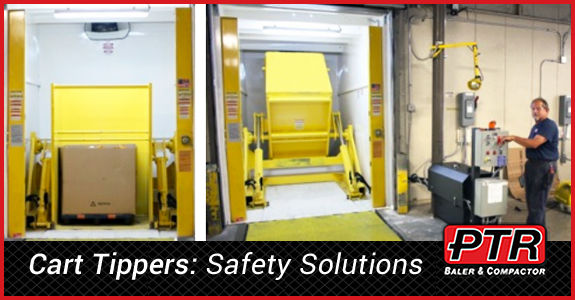Baler, Compactor or Both?
- vstarushchak
- Oct 17, 2019
- 2 min read
Would your company most benefit most from a baler or compactor? Many organizations find that they need both pieces of equipment to handle their recycling and waste management needs. In this blog post, we’ll briefly explain what each does and how to know which is best for you.

BALERS
Vertical Balers are used to bundle (or bale) your recyclable material. PTR balers are capable of handling cardboard, aluminum, plastic, paper and more. Some models are even able to handle tires, textiles, electronic waste, rugs and even heavier-duty recyclables such as white appliances, tires and non-ferrous metals.
Most organizations today are highly focused on recycling and sustainability initiatives. A recycling baler is key to implementing sustainability policies and processes. Diverting your recyclables from the landfill not only helps our external environment, but your internal environment as well. It helps save space and keep your workplace free of dangerous debris. This increases overall workplace safety, which in turn, reduces costly downtime due to employee injuries. Another major benefit is what was once waste is now a valuable commodity. Recycling bales, depending on volume, can be an unexpected new revenue stream for your business.
PTR offers a line of baler models in various sizes to suit your needs. View them here.
COMPACTORS
Compactors compress (or compact) large amounts of waste product. While it’s ideal to recycle as much as possible, some material is just not recyclable. That’s what this equipment is for. However, it’s still effective in decreasing waste, since you will be reducing the number of times you take trips to the landfill.
There are two types of compactors: self contained and stationary. Self Contained compactors are a great solution for your wet waste. This makes them ideal for malls, restaurants, movie theaters, hospitals, supermarkets and more industries that produce a lot of liquid or wet waste. PTR’s heavy duty models ensure no leakage or odor. View them here.
Stationary compactors on the other hand, can handle your dry, non-recyclable waste needs. Apartment buildings. Distribution warehouses, college campuses and clothing chains are among some of the industries that can benefit from a stationary compactor.
Both types of compactors reduce the overall amount of waste you produce and therefore, decrease trips to the landfill. This saves you on transportation and tipping feels, while decreasing your carbon footprint.
Many industries will benefit from both kinds of equipment. You may want to start the decision-making process by asking yourself the following questions:
What are your short-term and long-term sustainability goals?
Are you looking to recycle more?
Reduce trips to the landfill?
Reach a zero waste goals?
Talk to a PTR waste management equipment expert today to learn more about whether a PTR Baler, Compactor or both are best for your business.



